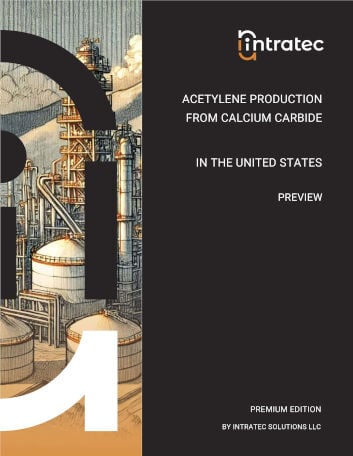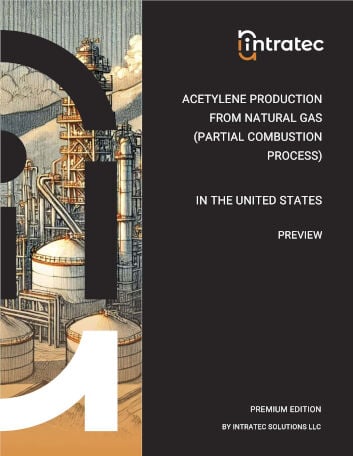Commodity Production Costs Report
Acetaldehyde Production from Acetylene (Vapor-Phase Hydration)
Acetaldehyde Plant Capital & Operating Cost Analysis | United States | Q4 2025
This report presents the economics of Acetaldehyde production from acetylene. The process examined is a typical vapor phase acetylene hydration over solid catalyst. In this process, steam is generated and mixed with acetylene. The gaseous stream is fed to fixed bed reactors in parallel, where acetylene is hydrated to form acetaldehyde. The excess of water in the reactor product is partially condensed and returned to the reactor. The gaseous stream is transferred to distillation units that recover unreacted acetylene for reuse and generate the purified acetaldehyde product.
The report provides a comprehensive study of Acetaldehyde production and related Acetaldehyde production cost, covering three key aspects: a complete description of the Acetaldehyde production process examined; an in-depth analysis of the related Acetaldehyde plant capital cost (Capex); and an evaluation of the respective Acetaldehyde plant operating costs (Opex).
The Acetaldehyde production process description includes a block flow diagram (BFD), an overview of the industrial site installations, detailing both the process unit and the necessary infrastructure, process consumption figures and comprehensive process flow diagrams (PFD). The Acetaldehyde plant capital cost analysis breaks down the Capex by plant cost (i.e., ISBL, OSBL and Contingency); owner's cost; working capital; and costs incurred during industrial plant commissioning and start-up. The Acetaldehyde plant operating costs analysis covers operating expenses, including variable costs like raw materials and utilities, and fixed costs such as maintenance, labor, and depreciation.

The process under analysis comprises two major sections: (1) Hydration; and (2) Purification.
Hydration. Acetylene and excess steam are heated to reaction temperature and fed to vertical reactor tubes operating alternatively, where the feed contacts catalyst at 350-400 °C. The reactors are arranged in such a way that while three reactors are actually operating, one is in catalyst regeneration cycle. The reaction medium is passed successively through three reactors, with fresh feed mixture and steam being fed to each of them; while the reaction is highly exothermic, quench water is employed for cooling each reactor effluent back to the desired reaction temperature. At the end, about 65% of the acetylene in the mixture react, with 90-95% of the reacted acetylene being converted to acetaldehyde.
Purification. The gaseous stream from the reactors, comprising ethylene, some unreacted acetylene, acetaldehyde product, and steam, is cooled and fed to a flash vessel, where heavy reaction by-products are removed and discarded, most of the water is recovered and recycled for quenching reactors effluents. The crude Acetaldehyde stream is further purified by distillation; the unreacted acetylene and remaining water are recycled.
Report in PDF Format
Download & Explore Anytime
Access in Various Devices
Print & Read Comfortably
Share With Co-workers
Up-to-date Report
Professional report based on Q4 2025 economic data, ensuring timely evaluations.
Multiple Use Cases
Ideal for investment screening, feasibility studies, cost estimates, and research planning.
Proven Methodology
Developed using a consistent methodology honed over a decade, ensuring reliable cost analyses.
Report Editions
Content Highlights
Plant Capital Cost Summary
Summary outlining the capital cost required for building the Acetaldehyde production plant examined.
Plant Capital Cost Details
Detailing of fixed capital (ISBL, OSBL & Owner’s Cost), working capital and additional capital requirements.
Plant Cost Breakdowns
Breakdown of Acetaldehyde process unit (ISBL) costs and infrastructure (OSBL) costs; plant cost breakdown per discipline.
Operating Costs Summary
Summary presenting the operating variable costs and the total operating cost of the Acetaldehyde production plant studied.
Operating Cost Details
Detailing of utilities costs, operating fixed costs and depreciation.
Plant Capacity Assessment
Comparative analysis of capital investment and operating costs for different Acetaldehyde plant capacities.
Production Process Information
Block Flow Diagram, descriptions of process unit (ISBL) and site infrastructure (OSBL).
Process Consumptions
Raw materials and utilities consumption figures, by-products credits, labor requirements
Process Diagrams
Process flow diagrams (PFD), equipment list and industrial site configuration
Other Acetaldehyde Production Cost Reports

Acetaldehyde Production from Ethylene (Two-Step Process)
This report presents a techno-economic analysis of Acetaldehyde production from ethylene in the United States using a typical two-step oxidation process. In this process ethylene is oxidized by air to Acetaldehyde in tubular reactors, using a palladium/copper catalyst system.
Details: 70 kta United States-based plant | Q4 2025 | 107 pages | Issue B | From $799 USD

Acetaldehyde Production from Acetylene (Liquid-Phase Hydration)
This study concerns Acetaldehyde production in the United States. The process reviewed in the study is an acetylene hydration in liquid phase similar to the technology developed by Chisso.
Details: 70 kta United States-based plant | Q4 2025 | 107 pages | Issue C | From $799 USD

Acetaldehyde Production from Ethylene (Single-Step Process)
This report assesses the economics of Acetaldehyde production from ethylene in the United States using a typical single-step oxidation process. In this process, ethylene oxidation is carried out by using high purity oxygen.
Details: 70 kta United States-based plant | Q4 2025 | 107 pages | Issue E | From $999 USD
Bundle & Save
Purchase multiple Acetaldehyde Production Cost reports and enjoy tiered discounts
up to 30% off!
Could Not Find the Report You Need?
Obtain a Bespoke Report
Get a report targeting the process in which you are interested
See Offer Details
Understand Bespoke Reports and how you can easily order them
Check Editions & Pricing
Complete a brief form and see a quotation for your Bespoke Report
Other Related Production Cost Reports

Acetylene Production from Calcium Carbide
This study presents the economics of Acetylene production from calcium carbide in the United States via wet process. In the process, calcium carbide reacts with water to form Acetylene. Hydrated lime is generated as by-product.
Details: 200 kta United States-based plant | Q4 2025 | 107 pages | Issue D | From $799 USD

Ethyl Acetate Production from Acetaldehyde
This report examines the economics of Ethyl Acetate production from acetaldehyde in the United States via Tishchenko reaction, which refers to the dimerization of acetaldehyde in the presence of an alkoxide catalyst to form the ester.
Details: 100 kta United States-based plant | Q4 2025 | 107 pages | Issue D | From $799 USD

Acetylene Production from Natural Gas (Partial Combustion Process)
This report presents the economics of Acetylene production from natural gas using a partial combustion process similar to that developed by BASF. In this process, methane from natural gas is cracked in high temperatures to acetylene and hydrogen. The economic analysis developed is based on a plant constructed in the United States.
Details: 50 kta United States-based plant | Q4 2025 | 107 pages | Issue A | From $799 USD
+800 Reports Developed, Targeting +250 Commodities
Vast Report Library
858 independent and up-to-date reports examining embryonic and established production processes.
Free Sample Reports
Quickly understand the structure and depth of content of our professional reports.

